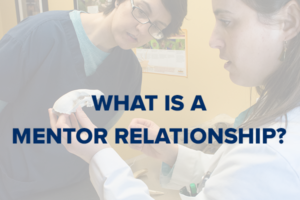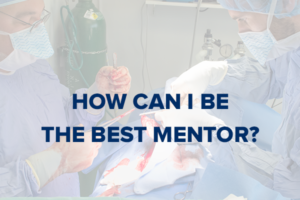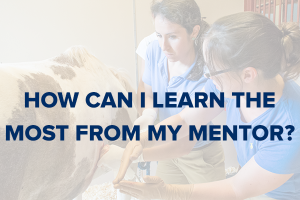GETTING THE MOST OUT OF A MENTOR RELATIONSHIP
WHAT MAKES A GREAT MENTEE?
A practical guide to the mentoring relationship.
By Bree Montana, DVM, VIN Foundation Vets4Vets® Program Leader
New hires of all levels of experience are also responsible for the quality of the mentoring relationship.
Relationships are always a two-way street. In order for your mentor to help you effectively, there are some things you’ll need to do.
Take a moment and mentally catalogue the information you want to know about the hospital you’ll be joining.
EQUIPMENT CONCERNS
Equipment is often an area of concern between practice owners and associates. I am often surprised to hear how many newer graduates see radiographic equipment as a key issue. I guess it’s because I’m so old school, I was already used to reading my own radiographs, so my digital toy didn’t really change things for me. I will admit being able to get a consult without having to “digitize” an old-world rad is much faster!
Many practitioners haven’t made the jump from traditional film-based radiographs to DR or CR. Excellent quality radiographs may be taken on traditional film, and digital images of the film-based radiographs will allow radiology consults. Be sure to check out a few rads before you cross a job off of your list simply because they don’t have the technology you became accustomed to in school.
OBSERVATIONS
Try to observe how your new hospital has adapted to tricky situations and patients. Your new team members probably have great ways of helping you deal with your cases without the equipment or drugs you thought you needed but remember to ask for help in a non-critical manner. For example: “What does Dr Boss use to check an ear for foxtails?” instead of “How am I supposed to look in this ear without a video-otoscope?” Techs can be an awesome support system; take a few days to learn the specific language of your new support team. Those team members will be essential to your success!
Mentees and newly hired veterinarians, what do you hope to learn from your boss/mentor? Each day, as you drive in to work, think through the things you appreciate most from your colleague. Be ready to verbally compliment them for techniques and technologies they are adding to your bag of tricks and ask for the specific guidance you will need during the day. Remember; great communications skills are like butter and salt — they make everything better!
MULTIPLE METHODS
There are many ways of mentoring — from intensive one-on-one training regimens to more casual remote mentoring relationships. You and your mentor can design a relationship that suits both of you. If you are a newer grad, a few days of shadowing can help you get used to the practice’s style of communication.
During the first few days with a new associate, I generally introduce my new colleague to my clients, giving a ten second intro; basically “selling” the new associate’s awesomeness to the client. Then I perform the exam, make the recommendations as per usual. Once the pet is in the treatment area, I’ll invite the shadowing associate to perform their own exam and make recommendations. We generally chat about each of the cases, sharing ideas for diagnostics and treatments. My goal during the shadowing period is to get the team comfortable working together. As soon as the new associated feels ready to go solo, we’ll start booking them appointments. I try to schedule juvenile exams and easier cases for my new colleague during the first month or so. I schedule longer appointment times to begin with, then decrease them as my new colleague becomes more efficient.
With more experienced veterinarians, I still provide longer appointment times initially. I’ll always schedule the new doctor with my most experienced technician for the first few weeks. My tech team knows the clients well and will help the doctor create estimates that make sense with our hospital’s style of medicine.
SCHEDULE MODIFICATIONS
Take a moment to consider the kinds of scheduling modifications you might need during your first few months.
If you are a newer grad, be sure to discuss appointment type and duration with your new boss and aggressively try to gain efficiency so you can get up to the clinic’s speed with nice, comfortable steps over the first few months.
I prefer to start new grads with longer appointments and only do anesthetic procedures on days we are together. We’ll adjust it over time. My practice uses intensive scheduling – 30 minute appointments with 15-min add ins. This means our first appointment starts at 9am and runs to 9:30 am, our second appointment starts at 9:15 am and runs till 9:45 am. I don’t expect newer grads (even with internship training) to “go there” for quite awhile.
Of course, this is my style as the culture of our practice is pretty information-intensive. We like to educate clients and develop the best bond we can. Some doctors have great success while being less chatty than I am, and there is nothing wrong with that! Every hospital, and every doctor, will develop the practice style that best suits their communication style and comfort level. Clients will settle in with the culture of practice that best suits their needs as well.
SURGERY HABITS
It’s important for you to become comfortable with the kinds of sedation your hospital offers; either your mentor or an experienced support team member may need to provide support during sedated procedures for the first few months. For the first few weeks, I’ll invite the new associate to scrub in with me on surgeries. I’ll usually do the first ovarian pedicle on the first OVH, then invite them to do the next. During these experiences, I’ll be sure to discuss good surgery habits.
For me, this means:
- Setting up the surgery tray in the same way each time (i.e., sharps to the left, clamps to the right, etc.)
- Maintaining excellent posture
- Breathing – I remind myself and my team that “when the going gets tough, the tough relax and breathe!”
- Self-focusing and calming techniques
Conversation during surgery lets my new team member relax and chat about comfortable topics while they work through their first surgeries in our facility. The topics also remind all of us — support staff as well as veterinarians– that high-quality performance is a habit that needs to be practiced.
It’s important to acknowledge the elephant living in the surgery suite — fear. We all experience it in practice.
Explaining that I use self-focusing techniques whenever the blood squirts into the air allows less experienced doctors to accept that they will experience some scary things in surgery and medicine, and that they will be able to face those challenges when they arise. When my body is tense, my mind is tense. I try to keep my body comfortable so I can make good decisions.
What focusing and calming techniques do you use when cases get tricky? What about your boss or the other associates in your practice?
MENTORING OPTIONS
If you’re more experienced, remote mentoring may be an option. I work remotely, on a very casual basis with several doctors. When they find themselves with a confusing case or difficult client, they e-mail me and we chat through options. With my own associates, I’ve been generally pretty available in person or via text message whenever they’re at work for the first year or so. If they have a critical case, I will come in from wherever I am and assist.
As they become more confident, I’ll swing by to review rads with them, or just be available for a quick question. Then, I’ll wean myself (ahem! I mean THEM) away and be available by e-mail or cell phone for questions.
I try to wait at least a few months before leaving a new associate completely alone. Everyone is unique, so you’ll need to feel your way with this one.
Practice owners all want our clients and patients to be in great hands, but we experience that “tension of the opposites” as we’d also like a week in Bimini.
Scheduling time once a week to work side-by-side with your mentor facilitates good communication. I initially schedule all of my associates’ procedure days when I’m on-site running outpatient appointments. This way I’m readily available for unexpected crises and moral support.
Work with your mentor to customize your mentoring program to suit your own comfort level.







